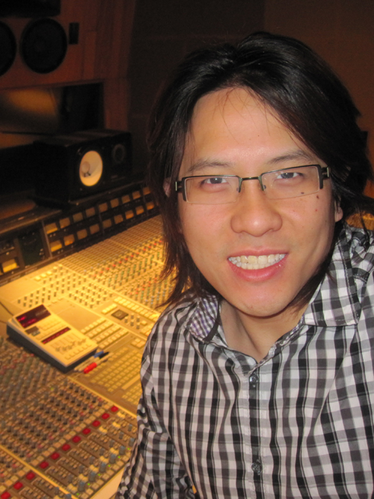Alumni Profile: Lenny Wee '08

Lenny Wee '08 at an iTunes recording session at the Record Plant
Photo provided by the artist

Wee edits a chart onstage.
Photo provided by the artist

At UNCF 2009, Wee was lucky enough to arrange and conduct for his own personal idol: Natalie Cole.
Photo provided by the artist
Working with musical director Rickey Minor, alumnus Lenny Wee has done engineering, arranging, or production (and sometimes all three) for broadcasts as large as the Grammys, the Super Bowl, and now American Idol. But the 2008 Berklee graduate was no stranger to hard work at Berklee, either. He completed a dual major in music production and engineering and contemporary writing and production—all in just two-and-a-half years.
What's it like working on American Idol?
Idol is a very well-oiled machine; I'm just a part of it. You've got to know where your talents can help out the most. There is a team of arrangers, and we each get one or two arrangements a week. I've been arranging and engineering the group songs every week, too. I go into rehearsal, I help the vocal coach teach the contestants their parts, and then we'll produce the session.
What's the schedule like?
It's very fast-paced. The turnaround is really quick because it's a week-to-week thing. Arrangers get the songs on Thursday evening. I work in the office during the day, where I handle production and stuff like that, so I'll stay up all night and write my arrangement, due Friday afternoon. Friday evening I get the group song, so I write all Friday night, too. Usually it's a pops orchestra—string section, horns, and rhythm section. Saturday I have the rehearsal with the contestants for the group song, so I play piano and teach them their parts with their vocal coach. Sunday we'll have the iTunes recording session for the contestants' weekly single. And then I might have another session for the group song. Monday we're in rehearsal all day for the show, and I most likely will have a session at night again, which I engineer. Then Tuesday is the live show, Wednesday is the results show, and that's basically my week.
How did Berklee help prepare you for this?
Part of it is the long hours. I was doing MP&E and CWP, so I had to budget my time and have sessions late at night. It's all about meeting deadlines in the industry. It is exhausting, but if you're in it for music, it's a love relationship. I love every second that I'm working.
I thought I was going have to choose between being an engineer and being an arranger before I started working, because I didn't think there were jobs that required both sets of skills, but I'm actually doing both here. It is hectic, but Berklee really prepared me for juggling the two sides of it, the technical and the creative.
What professor had the most impact on you?
I had Bill Elliott for most of my orchestration classes, and he really took me under his wing and taught me everything I know about orchestration. Bill actually recommended me for the job.
Lenny Wee's "I Have Risen," featuring Rebecca Muir
Any advice for current students?
Really, really do the work. You get out of it as much as you put in, and even though you may think, "I can do this and get a B and pass the class," if you really want to learn this stuff, you have to put in 100 percent. Take on the biggest projects, and if you fail, you fail, but at least you try and you think big at the start. You've got to put the time in. It's a lot of hard work and sweat. Talent without hard work is really nothing.
You just have to find your niche. I can pretty much say that I'm one of the very few arrangers who can actually place a mic. I'm one of the very few engineers that can write a chart. You just have to find something that you're special at and work very hard at it.
It really is up to you to learn all you can at Berklee. Don't stop asking questions. Don't sleep. When you're sleeping or partying, I'm there working and getting better at my craft. Because when you graduate you're not competing with Berklee kids anymore. You're competing with people who have been in the industry 20–30 years. It's really a wake-up call, because the job market is not easy and you really have to know your stuff. You still learn along the way, but really you've got to be prepared for it.
